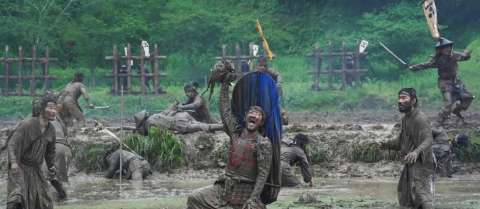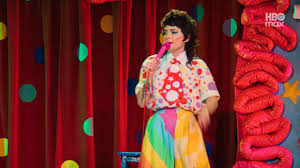Kubi 2023 Movie Review
“Kubi” has been on Kitano Takeshi’s (AKA Beat Takeshi) mind for so long that Kurosawa Akira was still alive to comment on it. In 1993, the legendary filmmaker predicted: “When Kitano directs this film, it will surely rival my own ‘Seven Samurai’.” Unfortunately, it’s one of the few times in his later life that Kurosawa was flat-out wrong, though Kitano’s long-in-the-works “Kubi” isn’t entirely without merit.
A re-imagining of real events in the late 16th century, the film’s eye-popping, blood-soaked vistas are a marvelous sight, as are a number of its era-specific details, and its handful of striking moments of queer samurai imagery. However, for the most part, Kitano’s tale of ambition and beheadings — many, many beheadings — loses nearly all momentum in its second half, before settling into a rote, repetitive rhythm.
Oda Nobunaga was considered the first “great unifier” of Japan, and he’s played here with a case of cackling villainy by a Dracula-caped Kase Ryo, who — despite his truncated role in what is essentially an ensemble piece — lights up the screen. If there’s one thing Kitano knows how to do, it’s extract fun performances from his cast. The central plot concerns the disappearance of one of Oda’s vassals, Murashige Araki (Endo Kenichi), accused by his lordship of rebellious sympathies, followed by Oda’s subsequent attempts to both capture him and suss out dissent within his empire, in a game of territorial chess. He enlists a number of other chieftains to hunt down Murashige — among them, Nishijima Hidetoshi’s diligent, straightforward Akechi Mitsuhide, and Kitano’s more relaxed and world-weary Toyotomi Hideyoshi — with the promise of naming one of them his successor, leading to skirmishes of ambition, and double (and triple) crosses that trickle all the way down the social ladder.
Complicating matters further is the fact that Oda, Murashige, and Akechi are involved in a love-triangle of sorts. The real Oda was long believed to have been involved with attendants of the same sex, an idea Kitano attempts to turn into an emotional and thematic centerpiece, with Murashige being enamored by Oda, Akechi being in love with Murashige, and everyone being seduced by power. This yields an electrifying moment where, in order to prove his loyalty to Oda, Murashige bloodies his mouth with his ruler’s blade before they lock lips. Murashige practically falls over himself for Oda’s approval, a cartoonish detail Endo imbues with fiery humanity through glances alone — but it’s one of only two scenes in the film that feels remotely sexually charged (the other is a passionate stare between two shirtless partners, but that’s about it). “Kubi” isn’t so much about queering samurai ambition as it is about likening it to a sexual urge, though neither side of this equation is ever presented with enough verve to sweep viewers up in its epic tale.
On the other hand, something Kitano excels at is presenting the absurdity of wanton bloodshed, an idea he sets his sights on early on. As more and more characters are introduced (peasants, performers, gangsters, gunmen, each with their own blood-red on screen text), what binds their stories together is their remorseless desire to scale the feudal hierarchy via the act of beheading.
The film’s title, which means “neck,” refers to the kubi bukoro (or “neck bag”), a kind of basket used to carry severed heads for evidence — a procedure that sees several characters stepping over one another in often ridiculous fashion. Right from the opening scene, Kitano revels cheekily in carnage of this particular nature, which he often depicts as cartoonish, and frames as cyclical — even meaningless. However, the collateral damage radiating outward from these scrambles for power are treated with a more deft and respectful hand. If a character loses a loved one, it’s far more tragic than the otherwise uproarious dismemberments on the battlefield or cowardly backstabbing — a tonal contrast Kitano establishes both easily and early on,.
The era’s pomp and circumstances is often front and center, with colorful, lumbering armors and heavy fabrics causing an irritating ruckus whenever the characters move. Kudos to the movie’s costume designers and foley team, who help make the legendary samurai seem uncomfortable in their skin, and distinctly un-cool with every step they take (that discomfort isn’t mirrored by the film’s queer characters, mind you; their love is an open secret). However, despite the fine attention to these era-specific details, Kitano’s filmmaking ends up about as over-eager as his scheming characters. Whatever he has to say about power structures, about queer-ness, and about zealous aspirations, he says both clearly and quickly into the movie’s 131-minute running time, so his story ends up back-ended by a repetitive display of surprise attacks and a myriad of pathos-free set pieces that feel practically indistinguishable.
This flattening of violent imagery is, in some ways, the entire point of “Kubi,” but it results in a paradoxical undercurrent to what is essentially a war film. The camera is constantly enamored with Kitano’s large-scale dioramas of mischievous movement and sudden blood-spatter. It’s often knee-slapping fun, but that’s a problem, since much of it also plays like a fatalistic rumination on the violence of men, and how it seeks to destroy. Kitano works hard to separate these kinds of scenes, but the switch between them is often abrupt (the ending is equally so), and their interplay seldom has anything worthwhile to say about violence or ambition — whether real or cinematic.
What little remains memorable about “Kubi” is only striking in isolation, born from threads, ideas, and slivers of images that seem to have been rattling around Kitano’s brain for over 30 years. Unfortunately, they’ve grown stale; a worthwhile bigger picture never emerges.




